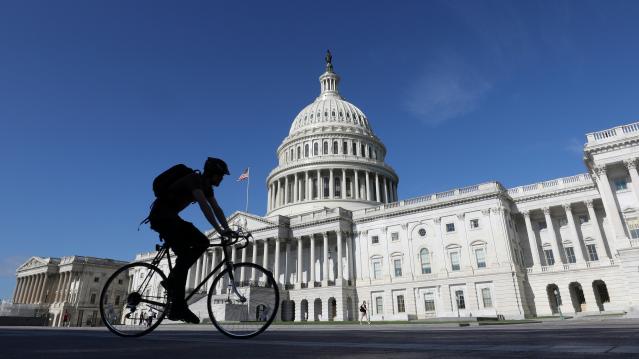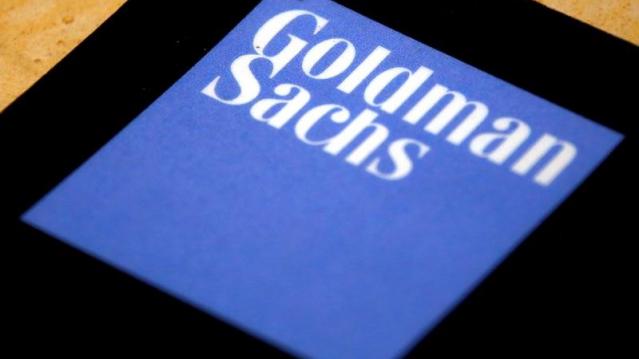Budget Deal Moving Ahead, Despite Outrage on the Right

The bipartisan deal to suspend the debt ceiling and increase federal spending over the next two years will get a vote in the House on Thursday, House Majority Leader Steny Hoyer (D-MD) said late Tuesday. Leaders in both parties have expressed confidence that the bill will pass before lawmakers leave town for their August recess.
"We're gonna pass it," Hoyer told reporters. "I think we'll get a good number [of votes]. I don't know if it's gonna be huge, but we're gonna pass it."
President Trump announced that he backs the deal, removing one possible hurdle for the bill. “Budget Deal gives great victories to our Military and Vets, keeps out Democrat poison pill riders. Republicans and Democrats in Congress need to act ASAP and support this deal,” he tweeted Tuesday evening.
Despite widespread agreement that the bill will pass, however, not everyone is on board.
Grumbles from the left: Some progressive Democrats have been critical of the deal, portraying it as too easy on Republicans. Worried that the agreement could set up a budget crisis in 2021, Rep. Ro Khanna (D-CA) said he was “concerned that it was a two-year deal. Why not a one year deal?... It seems like it’s basically handcuffing the next president.” Other liberals, noting that Democratic leaders have agreed to avoid “poison pill” riders on controversial issues such as abortion and funding for the border wall in the funding bills that must pass this fall, lamented their loss of leverage in those negotiations.
Outrage on the right: Resistance to the deal was more pronounced on the right, with the hardline House Freedom Caucus announcing Tuesday that it would not support the bill due to concerns about the growing national debt. “Our country is undeniably headed down a path of fiscal insolvency and rapidly approaching $23 trillion in debt. … All sides should go back to the drawing board and work around the clock, canceling recess if necessary, on a responsible budget agreement that serves American taxpayers better—not a $323 billion spending frenzy with no serious offsets,” the 31-member group said in a statement.
The deficit hawks at the Committee for Responsible Federal published “Five Reasons to Oppose the Budget Deal,” which include its purported $1.7 trillion cost over 10 years. CRFB noted that the agreement would increase discretionary spending by 21 percent during President Trump’s first term, pushing such spending to near-record levels.
Sen. John Kennedy (R-LA) was more colorful in his criticism, saying, “You don’t have to be Euclid to understand the math here. We’re like Thelma and Louise in that car headed toward the cliff.” Nevertheless, Kennedy said he would consider supporting the deal.
Is the deficit hawk dead? The budget deal represents “the culmination of years of slipping fiscal discipline in Washington,” said Robert Costa and Mike DeBonis of The Washington Post, and it highlights the declining influence of fiscal conservatives in the capital, at least as far as policy is concerned. Sen. James Lankford (R-OK) said the Republican Party’s credibility on fiscal restraint is “long gone.”
Although it may be too early to declare the fiscal hawk extinct – plenty of critics say the bird will return as soon as there’s a Democratic president – it certainly seems to be in ill health. As the University of Virginia's Larry Sabato said Wednesday: “A battered bird has been named to the list of endangered species. The ‘deficit hawk’ is on the road to extinction. Rarely spotted around Washington, D.C., the deficit hawk’s last remaining habitat is found in some state capitals.”
Some Republicans said that fiscal conservatism was never really a core Republican value, dating back to President Reagan’s tax-cut-and-spend policies, and that Paul Ryan’s emphasis on fiscal issues was an aberration. “It was never the party of Paul Ryan,” former House Speaker Newt Gingrich told the Post. “He’s a brilliant guy, but he filled a policy gap. The reality here is that Republicans were never going to get spending cuts with Speaker Pelosi running the House, and they didn’t want an economic meltdown or shutdown this summer.”
Is the whole debate missing the point? William Gale of the Brookings Institution, who served on President George H.W. Bush’s Council of Economic Advisers, said he wasn’t sure why the budget deal was producing so much hostility, since it basically maintains the status quo and – more importantly – is focused solely on discretionary spending. “There *is* a long-term budget issue,” Gale tweeted Tuesday, “but cutting [discretionary spending] is not the way to go.”
Instead, Gale says that any serious fiscal plan must focus on the mandatory side of the ledger, where the rapidly increasing costs of health care and retirement are straining against revenues reduced by repeated rounds of tax cuts. Gale recommends a combination of entitlement reductions and revenue increases – a standard mix of policy options that faces an uncertain future, with well-entrenched interest groups standing opposed to movement in either direction.
Tax Reform Is Hard, but the GOP Could Have Made This Easier
The Tax Policy Center’s William G. Gale writes that the GOP’s approach to the tax bill combines a $5.8 trillion tax cut with a $4.3 trillion tax increase to offset the costs. There may have been an easier way. “What if the House GOP simply tried to cut business and individual taxes by $1.5 trillion. No offsets needed. They could have distributed small tax cuts to middle-income individuals by, say, modestly expanding the earned income tax credit and raising the standard deduction. And they could have trimmed the top corporate tax rate by a few percentage points. It would not have been base-broadening tax reform, but neither is the current bill. ... Tax reform is never easy, but crafting the bill this way has vastly increased the challenge of passing it.”
Alan Greenspan: Deal with the National Debt Before Cutting Taxes

Former Federal Reserve Chairman Alan Greenspan is warning that sharply cutting taxes right now would be an economic “mistake.”
In an interview with Maria Bartiromo on the Fox Business Network Thursday, the 91-year-old Greenspan said it’s more important for President Trump and Congress to put the nation on a sustainable fiscal path by addressing rising entitlement spending driven by the aging of the U.S. population.
“Frankly, I think what we ought to be concerned about is the fact the federal debt is rising at a very rapid pace, and there’s nothing in this bill that will essentially stop that from happening," Greenspan said. "So my view is that we’re premature on fiscal stimulus, whether it’s tax cuts or expenditure increases. We’ve got to get the debt stabilized before we can even think in those terms.”
GOP’s Estate-Tax Repeal Details Would Save Super-Rich Tens of Billions Extra

It’s no surprise that the House Republicans’ tax bill includes the eventual repeal of the estate tax, a long-held GOP goal. But The Washington Post’s Glenn Kessler highlights an unexpectedly generous aspect of the current bill: It “allows the beneficiaries of estates to not pay capital gains taxes on the increase in value of assets held by the estates. That has not been a feature of most previous estate-tax bills.”
Currently, estates face a federal tax if they’re valued at more than $5.49 million for individuals or almost $11 million for couples. But, for tax purposes, the value of assets passed on to heirs gets “stepped-up” or reset to their value at the time of death. Kessler’s example: “Imagine a home that had been purchased for $250,000 but was now worth $1 million. The ‘stepped-up basis’ would be $1 million. If the heirs sold the house for $1.1 million, they would only owe capital-gains tax on the $100,000 difference, not the $850,000 difference from the original purchase price.”
The GOP bill repeals the estate tax, but also keeps the stepped-up basis — a seemingly small detail that creates a huge tax shelter. It means that heirs of large estates would save tens of billions of dollars a year when they sell assets that have appreciated in value over time — or, as Kessler puts it, that the bill will allow “tens of billions of untapped capital gains to remain beyond the reach of the U.S. government.”
Republicans Are Still Coming After Obamacare’s Individual Mandate

Speaker Paul Ryan said Sunday that House Republicans are still considering a repeal of the Obamacare individual mandate as part of their tax bill. "We have an active conversation with our members and a whole host of ideas on things to add to this bill. And that’s one of the things that’s being discussed," Ryan said on Fox News. President Trump touted the idea in a tweet last week, and Sens. Tom Cotton and Rand Paul have recently spoken in favor of using the tax bill to eliminate the mandate. The move would save the government $416 billion over 10 years as roughly 15 million people go without insurance due to lower spending on subsidies and health care services, according to the CBO. Those savings could be appealing as Republicans look for revenues in their revised tax bill. But if the controversial repeal of the mandate isn’t included in the tax bill, the White House is reportedly ready to roll out an executive order weakening the requirement that taxpayers provide proof of insurance to avoid paying a penalty.
Goldman Sachs Says Corporate Tax Rate Cuts May Get Phased In

Despite the challenges the Republican tax overhaul faces, Goldman Sachs still puts the chances of a plan becoming law by early next year at about 65 percent — but its analysts see some substantial changes coming before that happens. “The proposed tax cut is more front-loaded than we have expected; official estimates suggest a tax cut of 0.75% of GDP in 2018. However, we expect the final version to have a smaller near-term effect as competing priorities lead tax-writers to phase in some cuts—particularly corporate rate cuts—over time,” Goldman said in a note to clients Sunday.
